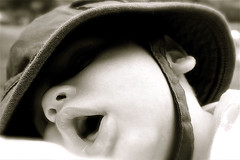
或许您没有对人类的睡眠姿势做过归类,如果有机会不妨注意一下,你会惊奇地发现,我们的睡姿是如此丰富。科学家认为,一个人的睡眠姿势和他的个性类型有着紧密的关联。英国睡眠评估和咨询服务机构主任Chris Idzikowski教授,分析了六种常见睡觉姿势,发现每一种睡姿正好对应着一种人格类型。或许我们可以通过对舍友、亲人的观察来验证这个研究结论,如果您不清楚自己的睡姿,不妨让您的亲人进来帮你确认一下。-psytopic.com
或许你还没有对自己在家里的睡眠姿势和舒适水平作过归类,下次飞行的时候不妨环顾一下机舱,你会惊奇地发现我们竟有如此丰富的各种睡眠姿势。
科学家认为一个人的睡眠姿势与其性格类型有紧密的联系。
你的睡姿是怎样的?
Chris Idzikowski教授,英国睡眠评估和咨询服务机构主任,分析了六种常见睡觉姿势,发现每一种睡姿正好对应着一种人格类型。
你的睡觉姿势:

图片著作权归BBC所有
睡觉姿势告诉了我们什么...
胎儿型(Foetus)
那些卷缩成胎儿姿势的人,被形容为外刚内柔,坚强的外表下有着一颗敏感的心。他们第一次见到别人的时候,可能会害羞,但很快能放松。这是最常见的睡眠姿势,在1000名的调查者中,有41%的人采用这种姿势。其中女性比男性多一倍。

树干型(Log)
双手在两侧笔直向下伸展,身体靠一边平躺。这种类型的人比较容易相处,爱交往,喜欢融入人群,容易信赖陌生人。不过,他们可能会被骗。
向往型(Yearner)
靠侧躺,双手由胸前向外伸展。这种类型的人一方面有开放性,另一方面则多疑,并愤世嫉俗。他们作决定比较缓慢,但一旦作出决定就不再改变。

战士型(Soldier)
背靠床仰面平躺,双手紧贴两侧。采用这种睡姿的人通常比较安静和内敛。他们不喜欢忙乱,对自己和对他人都定有较高标准。
自由落体型(Freefall)
面向床扑躺,双手抱枕,脸靠枕头偏向一侧。这类人容易合群,性情较急,但也能保持镇静,脸皮较薄,不喜欢批评或极端的情况。

海星型(Starfish)
面朝天花板仰躺,双手上翻靠枕。这种类型的人身边有很多好朋友,因为他总是在倾听对方,并且在别人需要的时候提供帮助。他们不喜欢成为注意的焦点。

其余参与调查的人则报告说,他们睡觉的姿势不稳定,或不知道。
Idzikowski教授同时分析了各种睡姿对健康的影响。他总结说,自由落体型有利于消化,海星型和战士型则容易引起打鼾和不良睡眠。
Idzikowski教授说,“仰面平躺意味着胃中的食物容易倒流到嘴里,这些仰躺的人在睡觉期间可能落会引起打鼾或呼吸不畅的情形,这两种姿势虽然都不足以使你惊醒,但不利于睡眠效果。”
这个研究还显示,大多数的人都不喜欢改变他们的睡觉姿势,只有5%的人说他们每晚到睡觉姿势都不同。
原文阅读《HOW DO YOU SLEEP ?》
You may not achieve the comfort levels and sleep position you are used to in your bed at home, but look around the cabin next time you fly to see the many different positions we adopt (or try to !) whilst asleep.
Scientists believe the position in which a person goes to sleep provides an important clue about the kind of person they are.
So .... what does your sleeping position actually say about you ?
Professor Chris Idzikowski, director of the UK Sleep Assessment and Advisory Service analysed six common sleeping positions - and found that each is linked to a particular personality type.
What your sleeping position says about you ...
Foetus
Those who curl up in the foetus position are described as tough on the outside but sensitive at heart. They may be shy when they first meet somebody, but soon relax. This is the most common sleeping position, adopted by 41% of the 1,000 people who took part in the survey. More than twice as many women as men tend to adopt this position.
Log
Lying on your side with both arms down by your side. These sleepers are easy going, social people who like being part of the in-crowd, and who are trusting of strangers. However, they may be gullible.
Yearner
People who sleep on their side with both arms out in front are said to have an open nature, but can be suspicious, cynical. They are slow to make up their minds, but once they have taken a decision, they are unlikely ever to change it.
Soldier
Lying on your back with both arms pinned to your sides. People who sleep in this position are generally quiet and reserved. They don't like a fuss, but set themselves and others high standards.
Freefall
Lying on your front with your hands around the pillow, and your head turned to one side. Often gregarious and brash people, but can be nervy and thin-skinned underneath, and don't like criticism, or extreme situations.
Starfish
Lying on your back with both arms up around the pillow. These sleepers make good friends because they are always ready to listen to others, and offer help when needed. They generally don't like to be the centre of attention.
The remainder of those in the poll said the position they fell asleep varied or did not know.
Professor Idzikowski also examined the effect of various sleeping positions on health. He concluded that the freefall position was good for digestion, while the starfish and soldier positions were more likely to lead to snoring and a bad night's sleep.
Professor Idzikowski said "Lying down flat means that stomach contents can more readily be worked back up into the mouth, while those who lie on their back may end up snoring and breathing less well during the night. "Both these postures may not necessarily awaken the sleeper but could cause a less refreshing night's sleep."
The research also found that most people are unlikely to change their sleeping position. Just 5% said they sleep in a different position every night.
Psytopic成员lightor翻译作品/原文链接
No comments:
Post a Comment